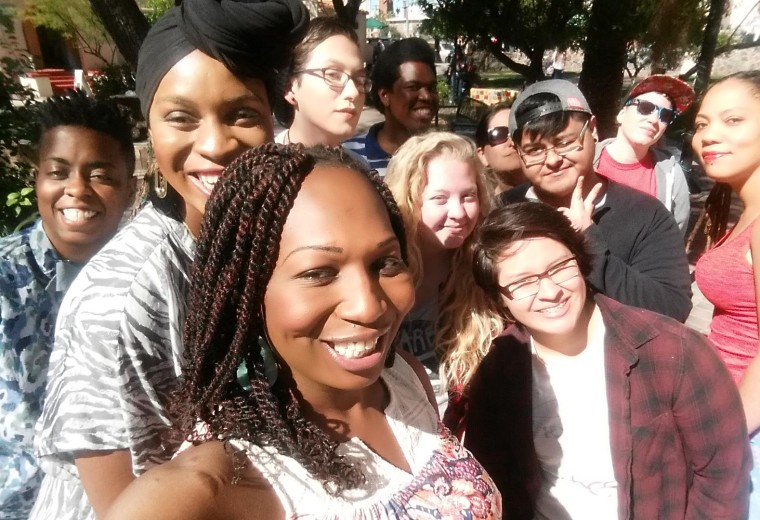|
This past weekend, the world watched as an estimated 2.9 million people came together to form the largest one-day protest in U.S. history, and while the event itself will no doubt be remembered as a landmark moment in Washington’s long record of reactionary marches and protests, the Women’s March was not without flaws. One of the largest complaints-- voiced overwhelmingly by women and gender non-conforming people of color-- was that in refusing to accommodate the concerns of queer and/or disabled nonwhite people, and promoting cissexist Second Wave feminist rhetoric, the march alienated the people who will be most affected by Trump's administration while praising for their “efforts” those who have the least to lose: cisgender, middle-class, able-bodied white women. The truth of the event is that for many people, it will be a one-time commitment; an unfortunate reality is that not everyone is willing (or able to) invest the time and energy that on-ground protesting necessitates. Thankfully, there are other ways to support the necessary activist work that marginalized people are doing that go beyond the limits of physical labor. Amidst rumors that Trump plans to cut funding for the NEA and NEH, making a commitment to fund the artistic aims of nonwhite people will be especially important in the next four years. Here I've compiled a list of organizations to support, with special attention given to two collectives for trans women. A larger list can be found at the bottom of the blog post. Photo credit: Trans Women of Color Collective Trans Women Writers Collective: Much like the TWOCC, The Trans Women Writers Collective is an organization founded by trans women, for trans women, working to publish trans women writers and pay them for their work. Most importantly, perhaps, is the fact that the Trans Women Writers Collective “exists, above all, to improve conditions for the most marginalized writers in our community: black trans women, Indigenous trans women, disabled trans women, incarcerated and detained and undocumented trans women.” The Collective’s first major project, an anthology of fiction by trans women of color called “Nameless Woman,” is due for release this coming Spring. Trans Women of Color Collective: It is no surprise that trans and gender-nonconforming people of color are disproportionately targeted by the state for physical violence. TWOCC, according to their mission statement, is a “grassroots-funded global initiative created to offer opportunities for trans people of color, our families and our comrades to engage in healing, foster kinship, and build community.” Several of the collective’s leaders, including Dane Figueroa Edidi and Koko Jones, are writers and artists. You can donate to the Collective here, and explore their press page here. American Civil Liberties Union: According to their website, “the ACLU is a nonprofit, nonpartisan, legal and advocacy organization devoted to protecting the basic civil liberties of everyone in America.” In this moment, political advocacy is slotted as one of the country’s most vital (and fragile) areas of needed support, and as a nonpartisan organization, the ACLU works to defend the civil rights of all Americans. With branch offices in all fifty states, some of the ACLU’s most urgent work as of late include pushing for transparency during Trump’s campaign process and now, at the beginning of his presidency, and providing legal assistance in the fight against the Dakota Access Pipeline. You can donate to The American Civil Liberties Union here. Autistic Self-Advocacy Network: Focused on public policy advocacy, autistic cultural activities and leadership training, ASAN is a disability rights organization run by and for autistic Americans. They inform about autism and systems change to the public, and their members include autistic individuals as well as cross-disability advocates. Their national office is headquartered in Washington, DC, and their resource library includes numerous publications and briefs. Donate here. The 65: The 65 is your reminder to call your representatives, now. Through their Weekly Call to Action (WCTA), the site uploads a progessive agenda focus for the week to inspire constituents to take advantage of congress' surprising accessibility; their Issues List is an assortment of scripts for all sorts of agenda focuses (among them gun violence, police brutality, and Trump's cabinet nominations) that help eliminate the anxiety of not knowing what to say when you're on the phone with your Senator. While The 65 isn't open to donations, they are definitely a resource to keep bookmarked. Other Organizations/Collectives: ACT UP Asian Americans Advancing Justice Asian American Journalist Association Audre Lorde Project Black Alliance for Just Immigration Black Liberation Project Black Movement Law Project CAAAV Organizing Asian Communities Chinese Progressive Association Doctors Without Borders Domestic Workers United Global Action Project Jews for Racial and Economic Justice Movement for Black Lives National Network for Immigrant and Refugee Rights Open Hillel Planned Parenthood South Asian Americans Leading Together Southern Poverty Law Center Transgender and Intersex Justice Project War Resisters League Water Protector Legal Collective 350 Lyrik Courtneyis the blog editor of TRACK//FOUR, and a high school senior who sits at the cultural intersection of African-American and nonbinary gender (ca. 1999). Their work has been featured in/is forthcoming in Blueshift Journal, Liminality Magazine, and Ninth Letter, as well as other places. The nature of their existence is oftentimes disorienting, but you can always find them tweeting at @lyrik_c.
1 Comment
|
The TRACK//FOUR Blog discusses all things literature and art, and celebrates the accomplishments of our contributors. Archives
July 2018
Categories |


 RSS Feed
RSS Feed
